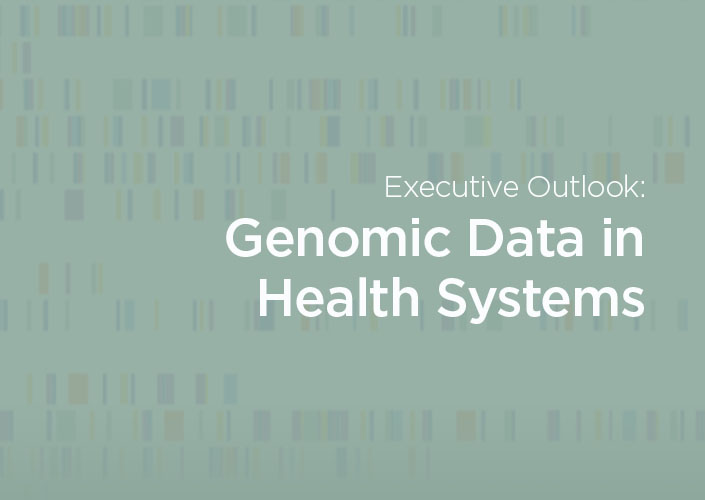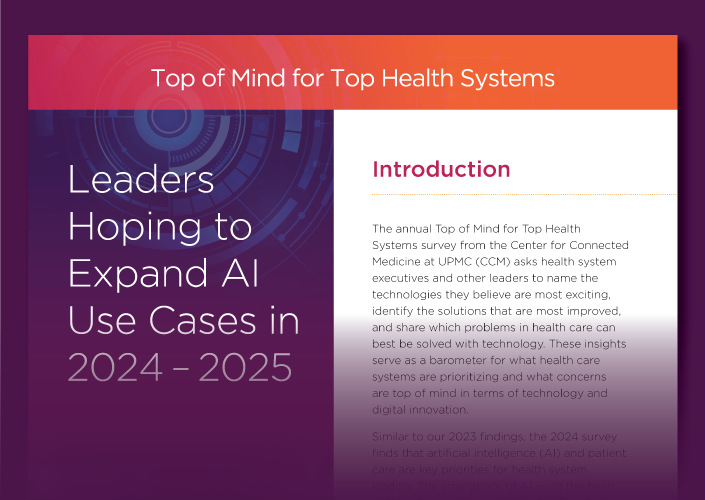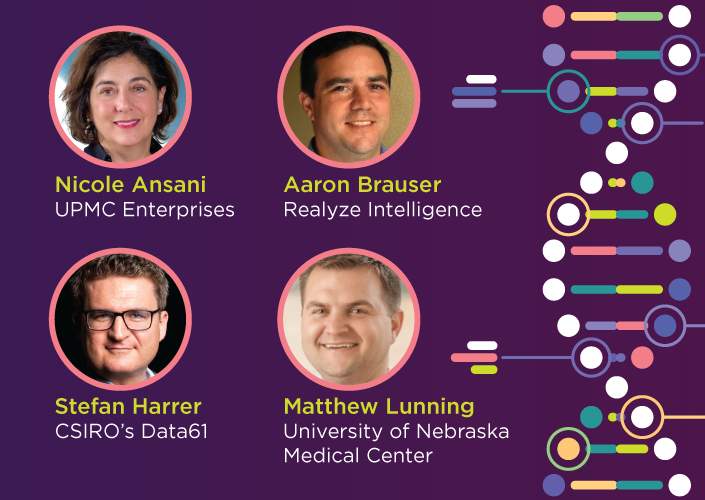CCM research on genomic data management highlights need for enterprise-wide strategy
Health systems that are serious about pursuing precision medicine to improve outcomes for their patients should adopt an enterprise-wide strategy for management of genomic data.
That was one of several key findings from “Genomic Data in Health Systems,” a research report published by the Center for Connected Medicine (CCM) in 2020. Even though parts of the broader health care system have been changed by the COVID-19 pandemic since the CCM’s report on genomic data management was published, an expert from health system UPMC believes the research findings remain relevant.
“It was interesting to look at the report a year down the line and one of the big takeaways that stood out for me was the fact that the research highlighted the need for a cohesive strategy and strong platform technology to underpin the adoption of precision medicine,” said Matthias J. Kleinz, DVM, PhD, Senior Vice President of Translational Sciences at UPMC Enterprises.
“I don’t think the pandemic fundamentally has changed the results of the survey and ultimately I think the insights this report generates provide a path to adopting precision medicine in health care,” Dr. Kleinz continued.
Demand for genomic testing is returning
Dr. Kleinz was one of seven leaders from UPMC and University of Pittsburgh to serve on an advisory committee for the CCM’s precision medicine and genomics research, events, and other resources.
“Genomic Data in Health Systems,” which can be downloaded for free from the CCM Resources page, was based on a survey of more than 100 representatives of U.S. hospitals and health systems in information technology, informatics, business, and clinical roles.
At the time of the report’s publication in 2020, many health systems were shutting down non-emergency care to focus on treating patients with COVID. At that time Dr. Kleinz speculated on the impact the pandemic would have on precision medicine programs and on innovation in health care broadly.
WATCH: Expert Panel Discussion on Population Scale Genomics
While the pandemic had a suppressive impact on the use of precision medicine in health care — because fewer people were seeking care and therefore not receiving genomic testing and other screening services — Dr. Kleinz noted that demand for testing services is now returning.
“We are emerging from that from that period and we’re now seeing strong demand for screening tests and ultimately proactive management of an individual’s health. And as that happens, precision medicine will get back to the rightful place it has in the care continuum,” Dr. Kleinz said.
Download the “Genomic Data in Health Systems” research report
Clinical trial innovation was positive from pandemic
Innovation also received a boost during the pandemic. While much has been publicized regarding health systems’ pivot to delivering care via telemedicine, perhaps less well known is the innovation that took place in science and data collection for understanding what treatments were helpful for COVID-19 patients.
“I think the industry, and that includes health care provider organizations, started to use a nimbler approach to the way we think about innovation and the way that we think about testing health care technologies in a day-to-day, or real-world, health care setting,” Dr. Kleinz said.
The Plan for Genomic Data: Consumable, Integrated, Enterprise-Wide
UPMC was a site for the Randomised, Embedded, Multi-factorial, Adaptive Platform (REMAP) trial that tested potential treatments for COVID in health care settings.
“That made a real difference,” Dr. Kleinz said. “The acceptance of regulatory authorities and the broader medical and scientific community of engaging in collecting real-world data on an almost real-time level and making decisions on this data — as opposed to continuing to adhere to their traditional mantra of randomized, controlled trials, which take time and effort — these platform approaches have had a real impact during the pandemic.”
UPMC entering age of precision medicine with purpose
Building on these successes and others, along with substantial investments in the infrastructure for precision medicine that UPMC made prior to the pandemic, Dr. Kleinz said the organization “is moving toward the age of precision medicine with real purpose.”
Infographic: Harnessing Genomic Data in Health Systems
The health system opened the UPMC Genome Center, a high-throughput, industrial-scale sequencing center in Pittsburgh, and UPMC is a leader in the research and adoption of pharmacogenomic approaches, he noted.
“All of that highlights how important precision medicine has been and will be for UPMC going forward,” he said. “When you combine that with the investments that we’ve also made in data and analytics, we are in a really strong position to understand the impact of novel precision medicine approaches in the real-world health care setting and therefore help provide some of the evidence that’s still required to support the broader adoption of precision medicine approaches in health care.”
More resources related to genomics and precision medicine from the CCM
Download the report, “Genomic Data in Health Systems: Survey results on the importance of an enterprise-wide strategy”
Read insights from UPMC’s Chief Medical Information Officer in, “The Plan for Genomic Data: Consumable, Integrated, Enterprise-Wide”
See 10 findings from the genomic data management research by downloading the infographic, “Harnessing Genomic Data in Health Systems”
Precision medicine was one of three key priorities areas for health systems identified by the CCM’s “Top of Mind for Top Health Systems 2020” report
Primary care physicians need greater education on genomics, Dr. Mylynda Massart says



